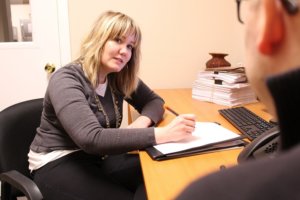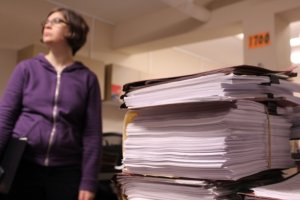quay lại tất cả các bài đăng trên blog
Bringing out the BEST for CCC Clients
Thứ Năm, Tháng Ba 29, 2018Khối nội dung này không có bản xem trước.
Want to contact the BEST team? Call 971-271-6352 or email bestinfo@ccconcern.org.
A detailed application. Multiple questionnaires. Medical exams and psychiatric assessments. Probing, personal questions about your past. Unforgiving deadlines.
Just reading those words might be enough to make you feel overwhelmed. Welcome to the process for pursuing Social Security benefits.
The application process is notorious for being as complicated as it is comprehensive: it ensures that only those who are truly unable to earn wages receive Social Security Disability Insurance (SSDI), Supplemental Security Income (SSI) or both. Unfortunately, the high degree of difficulty also means those who are most in need of the stabilizing lifeline of Social Security income are often unable to successfully apply on their own.

BEST program staffers build the strongest Social Security benefits case possible for each client by reviewing medical records, performing interviews and coordinating assessments.
Many of the people CCC serves fit in this category. So since 2008, CCC’s Benefits and Entitlements Specialist Team (BEST) has helped particularly vulnerable individuals—most experiencing homelessness or deep poverty and living with severe disabilities that keep them from gaining their own income through employment—navigate the maze.
“The stress of telling their story and reliving traumas is often overwhelming and triggering,” says Kas Causeya, BEST’s program manager. “Add in complicated terminology and unfamiliarity with the Social Security Administration (SSA) and Disability Determination Service (DDS) criteria for awardees, and the applicant’s chance for errors rockets up if they try on their own.”
BEST’s benefits specialists walk side-by-side with each client and use their expertise to maximize the chances of a successful application. They gather information through interviews with the client and those who may know more about their situation. They coordinate psychological and medical exams, which BEST pays for. And while the client’s cognitive impairment can add a level of difficulty, BEST specialists doggedly track down as much information as they can to build the strongest case possible. Stacks of paperwork over a foot tall for each case are common.
The goal is to gain approval for Social Security benefits. To awardees, their income is much more than a check. It represents pride in being able to meet basic needs and pay rent. It inspires feelings of dignity by giving them a means to make purchases that allow a measure of self-sufficiency. Financial stability gives them freedom to engage meaningfully with their communities.
Since 2008, more than 1,600 people have found hope with the help of BEST.
Expert Help Brings a Better Chance
Kellie F. counts herself among the fortunate. She has an exceedingly difficult time remembering things, a lifelong condition that has caused her great difficulties. She experienced multiple traumas growing up, and fresher ones as she moved through adulthood. She became heavily dependent on alcohol to cope.
“My memory thing is really flustering. There are things I wish I wish I could remember that I can’t. And there are some things from my past I don’t want to remember, but I do.”
Her substance use disorder brought Kellie to CCC’s Hooper Detox. From there she engaged with CCC’s 8×8 Recovery Housing program, where she started developing the tools and skills for successful long-term recovery. Her case manager recognized Kellie’s difficulty with memory and referred her to the BEST program to see if she might qualify for Social Security. That’s where she met Marshal, a BEST specialist.
“Kellie was very eager and motivated to engage in the BEST process. As I reviewed her case, I read the story of someone who faced significant barriers to work but who, despite much suffering and hardship, continued to persevere,” recollects Marshal.

Stacks of paperwork that grow to a foot high over the course of building a client’s case are a common sight in the BEST office.
Together, Marshal and Kellie dived into the process. They explored Kellie’s understanding of her impairments and how they impacted her daily life. Marshal took her to a psychologist for a cognitive evaluation, helped her complete a phone interview with the Social Security office, met with her to review her work history, and again to go over little details to further strengthen her claim. Marshal and the BEST team reviewed all her medical records, wrote a detailed report summarizing their argument for Kellie’s behalf and kept in regular contact with SSA and DDS. Through it all, he kept the line of communication with Kellie as open and inviting as possible, earning and nurturing a sense of mutual trust.
“I felt nervous at first about [applying]. And there were times when I felt overwhelmed by the questions,” Kellie says. “But Marshal was really encouraging and supportive.”
Kellie and Marshal had good reason to feel optimistic about her chances once they sent in her application.
Due to their fluency in the system, BEST wins 67% of their initial applications, compared to 32% of applicants from the general population—and only 15% of applicants nationwide who are homeless.
On average, applicants receive an initial decision about 110 days after they submit their application; for BEST clients, they hear back, on average, within 74 days. Kellie received her results. But as is the case in 33 percent of BEST’s initial applications, Kellie received a heartbreaking denial. “I felt like I didn’t know where I was going to go from there,” she says.
Marshal acted quickly to reconfigure and strengthen Kellie’s case and filed for reconsideration. “We don’t like to see denials as ‘no,’” says Marshal. “We take it as a ‘just not yet’ and go from there.”
BEST’s perseverance pays off. An additional 6% of BEST’s clients win awards after a reconsideration or appeal, upping their overall success rate to 72%.
Kellie eventually received a second letter. She had qualified for SSDI. Marshal’s extra efforts made all the difference.
“They saw that I really do have a disability that keeps me from working,” she says. “I was very happy about that. Having an income now gives me more hope. I can imagine better things to come.”
“Having an income now gives me more hope. I can imagine better things to come.”
Benefits with Far-Reaching Impact
So far, the 1,600+ benefits awards BEST has won have brought in nearly $65 million to Portland and Multnomah County. That’s $65 million pumped into the local economy through rent, groceries and other daily economic activity.
Behind each of the awards—and the reams of paperwork and hours of information gathering that went into it—is a person who has found stability they wouldn’t have had otherwise. A person who doesn’t feel as anxious about how they’ll afford necessities. A person who feels prepared to become a contributing part of the community. A person like Kellie.
“When I found out I qualified for SSDI, I felt like I could be part of society again. I feel better about myself now,” she says. “I actually just put in an application to do some volunteering.”
It often takes many hands to guide people toward self-sufficiency, whatever that ends up looking like for each individual. Since 2008, more than 150 community partners— including BEST’s original partners, the City of Portland, Providence Health & Services and the Kaiser Community Fund—have played some role in helping more than 1,600 people achieve independence.
Receiving benefits doesn’t make Kellie’s memory impairments any better. They continue to severely affect how she navigates through each day. But now she has a perspective that keeps her looking and moving forward.
“I can remember the things I need to remember that keep me on the good path now. Life is a heck of a lot better than it was.”
Khối nội dung này không có bản xem trước.
Learn more about Central City Concern’s approach to ending homelessness by providing wraparound, integrated support for people in need.